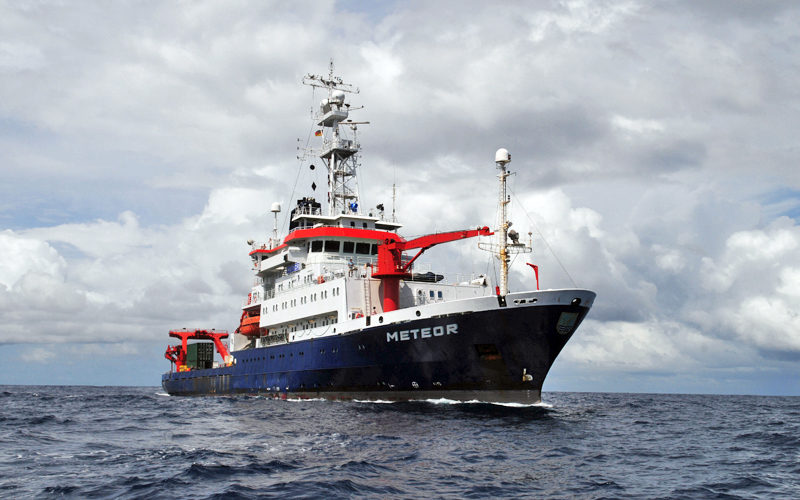METEOR M130
- Area:
- Southern Tropical Atlantic
- Time:
-
28.08.2016 - 03.10.2016
- Institution:
- GEOMAR
- Chief scientist:
- Marcus Dengler
The research program of cruise M130 is a combination of observations of the Kiel Collaborative Research Center SFB 754 (”Climate - Biogeochemistry Interactions in the Tropical Ocean“) and the BMBF joint project RACE II. Within the framework of the SFB 754, ventilation processes of the oxygen minimum zone (OMZ), including lateral mixing, vertical mixing and oxygen advection (subproject (SP) A3 and A4) as well as the role of zooplankton for oxygen consumption and biogeochemical cycles (SP B4, B8) will be investigated. Within the present synthesis phase of this project a special emphasis will be payed on estimating the oxygen consumption. For this purpose tracer observations will be carried out within the oxygen minimum zone in order to assess the age of the tracers and hence the water masses. These tracer ages will then be used to assess the oxygen consumption. At the equator, the cruise will focus on the equatorial current system and its interannual variability. Furthermore the role of the current system and its variability for the zonal transport of heat, freshwater, and oxygen will be investigated (BMBF RACE II, SFB 754).
Within the framework of RACE II the aim of this cruise is to investigate the variability of the western boundary current system off South America as well as providing a contribution for an estimate of the Atlantic meriodional overturning circulation (AMOC) at 11°S. A particular focus at the western boundary will be on the transport variability of the North Brazil Undercurrent (NBUC)—as part of the AMOC and the subtropical cells (STCs)—on timescales from intraseasonal to decadal.
The main operations during M130 will be the recovery and redeployment of several deep sea moorings, station work and the data upload of two moored pressure inverted echo sounders (PIES). For the station work a combination of CTD/Lowered ADCP/Underwater Vision Profiler (UVP), a microstructure probe, a zooplankton multinet and a drop sonde measuring the absorption of photosynthetically active radiation will be used. In addition, underway measurements of upper ocean currents with the two shipboard ADCPs and hydrographic measurements with the thermosalinograph probe will be performed.



